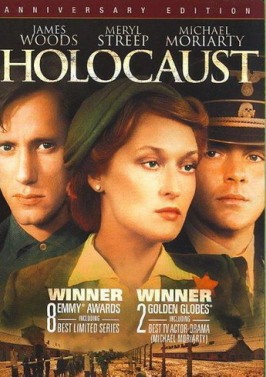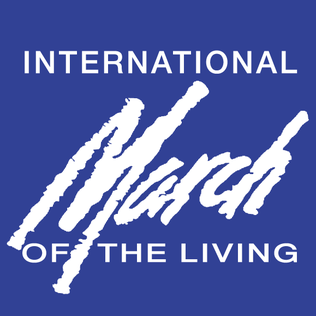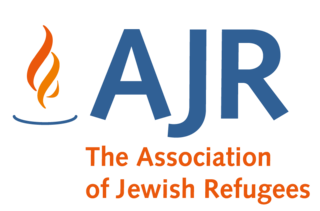Related Research Articles

Kristallnacht (German pronunciation:[kʁɪsˈtalnaχt]lit. 'crystal night') or the Night of Broken Glass, also called the November pogrom(s) (German: Novemberpogrome, pronounced[noˈvɛm.bɐ.poˌɡʁoːmə] ), was a pogrom against Jews carried out by the Nazi Party's Sturmabteilung (SA) and Schutzstaffel (SS) paramilitary forces along with some participation from the Hitler Youth and German civilians throughout Nazi Germany on 9–10 November 1938. The German authorities looked on without intervening. The euphemistic name Kristallnacht comes from the shards of broken glass that littered the streets after the windows of Jewish-owned stores, buildings, and synagogues were smashed. The pretext for the attacks was the assassination of the German diplomat Ernst vom Rath by Herschel Grynszpan, a 17-year-old German-born Polish Jew living in Paris.

The Kindertransport was an organised rescue effort of children from Nazi-controlled territory that took place in 1938–1939 during the nine months prior to the outbreak of the Second World War. The United Kingdom took in nearly 10,000 children, most of them Jewish, from Germany, Austria, Czechoslovakia, Poland, and the Free City of Danzig. The children were placed in British foster homes, hostels, schools, and farms. Often they were the only members of their families who survived the Holocaust. The programme was supported, publicised, and encouraged by the British government, which waived the visa immigration requirements that were not within the ability of the British Jewish community to fulfil. The British government placed no numerical limit on the programme; it was the start of the Second World War that brought it to an end, by which time about 10,000 kindertransport children had been brought to the country.

The Évian Conference was convened 6–15 July 1938 at Évian-les-Bains, France, to address the problem of German and Austrian Jewish refugees wishing to flee persecution by Nazi Germany. It was the initiative of United States President Franklin D. Roosevelt who perhaps hoped to obtain commitments from some of the invited nations to accept more refugees, although he took pains to avoid stating that objective expressly. Historians have suggested that Roosevelt desired to deflect attention and criticism from American policy that severely limited the quota of refugees admitted to the United States.

Holocaust (1978) is an American television miniseries which aired on NBC over four nights, from April 16 — April 20, 1978.
Refuge is a place or state of safety. It may also refer to a more specific meaning:

The Montreal Holocaust Museum is a museum located in Montreal, Quebec, Canada. It is dedicated to educating people of all ages and backgrounds about the Holocaust, while sensitizing the public to the universal perils of antisemitism, racism, hate and indifference. Through the museum, its commemorative programs and educational initiatives, it aims to promote respect for diversity and the sanctity of human life. The Museum was founded in 1979 as the Montreal Holocaust Memorial Centre and is Canada's first and only recognized Holocaust museum.

The March of the Living is an annual educational program which brings students from around the world to Poland, where they explore the remnants of the Holocaust. On Holocaust Memorial Day observed in the Jewish calendar, thousands of participants march silently from Auschwitz to Birkenau.

Priest's Grotto also known as Ozerna or Blue Lakes Cave, is a cave in western Ukraine near the village of Strilkivtsi, Chortkiv Raion, Ternopil Oblast (Province).
Holocaust survivors are people who survived the Holocaust, defined as the persecution and attempted annihilation of the Jews by Nazi Germany and its allies before and during World War II in Europe and North Africa. There is no universally accepted definition of the term, and it has been applied variously to Jews who survived the war in German-occupied Europe or other Axis territories, as well as to those who fled to Allied and neutral countries before or during the war. In some cases, non-Jews who also experienced collective persecution under the Nazi regime are considered Holocaust survivors as well. The definition has evolved over time.

My Opposition: The Diaries of Friedrich Kellner is a 2007 documentary television film about an orphaned American who went in search of his German grandfather and discovered a secret diary written during the time of the Third Reich. The film is a production of Abella Entertainment Ltd. of Toronto, Canada, co-produced and co-directed by Arnie Zipursky and Fern Levitt, with executive co-producer Leonard Asper of CanWest Global. The film is distributed by CCI Releasing.
The One Thousand Children (OTC) is a designation, created in 2000, which is used to refer to the approximately 1,400 Jewish children who were rescued from Nazi Germany and other Nazi-occupied or threatened European countries, and who were taken directly to the United States during the period 1934–1945. The phrase "One Thousand Children" only refers to those children who came unaccompanied and left their parents behind back in Europe. In nearly all cases, their parents were not able to escape with their children, because they could not get the necessary visas among other reasons. Later, nearly all these parents were murdered by the Nazis.

TheAssociation of Jewish Refugees (AJR) is the specialist nationwide social and welfare services charity representing and supporting Jewish victims of Nazi oppression, and their dependants and descendants, living in Great Britain.
Pierre Sauvage is a French-American documentary filmmaker and lecturer, who was a child survivor of the Holocaust. He is described by Tablet Magazine as "a filmmaker of rare moral perception."

The Touch of an Angel is a 2015 Polish documentary film directed by Marek Tomasz Pawłowski. It is a personal, poetic memoir of a deaf man who returns to the places where he found refuge as a Jewish boy during World War II. He finds his hiding places and bunkers still standing, bringing back horrific memories. The film emphasizes the role of Poles in saving persecuted Jews and indifference of the international community at large in the face of Nazi threats.

Walter Bingham is a German-born British-Israeli journalist, actor, and businessman, as well as a Holocaust survivor and decorated World War II veteran. At age 99 in 2023, Bingham was Israel's oldest working journalist.

The March of the Living Digital Archive Project, begun in 2013, aims to gather Holocaust testimony from Canadian survivors who have participated in the March of the Living. Since 1988, Holocaust survivors have traveled to Poland with young students on the March of the Living to share their Holocaust stories in the locations they transpired.
Sidney Zoltak, is a Polish-Canadian author, Holocaust educator and the subject of several films. Zoltak has been featured on CBC in a special done by the channel.

Gilbert and Eleanor Kraus were an American couple known for rescuing 50 Jewish children prior to the beginning of World War II.
Max Lewkowicz is a Canadian writer, producer, director, and the founder and owner of Dog Green Productions. He is best known for his work as director, producer, and writer of Fiddler: A Miracle of Miracles (2019), Underfire: The Untold Story of Pfc. Tony Vaccaro (2016) and Morgenthau: Three Men, Three Generations, One Fight (2013).
References
- ↑ "NBC 5 News at 5 - NBC Chicago Segment on REFUGE: Stories of the Selfhelp Home". NBC News. May 31, 2012.
- ↑ "New documentary, 'Refuge: Stores of the Selfhelp Home,' gives voice to the last generation of the Holocaust". JUF News. May 2, 2012.
- 1 2 "Refuge: Stories of the Selfhelp Home | WOUB". WOUB Public Radio "Conversations from Studio B". September 2, 2012. Archived from the original on October 15, 2012. Retrieved November 9, 2012.
- ↑ "Holocaust Museum: Film explores last survivor generation". Evanston Review. June 5, 2012. Archived from the original on February 3, 2013.
- ↑ "Eytan Bensinger: Making the Past Come Alive". Israel National Radio. September 5, 2012.
- ↑ "REFUGE: Stories of the Selfhelp Home".
- ↑ "Selfhlp Community Services". Archived from the original on October 30, 2012. Retrieved November 9, 2012.
- 1 2 "Touching Story of the Selfhelp Home". Chicago Jewish News. July 27, 2012. Archived from the original on June 3, 2013. Retrieved November 9, 2012.